|
|
|
Sort Order |
|
|
|
Items / Page
|
|
|
|
|
|
|
| Srl | Item |
| 1 |
ID:
157411
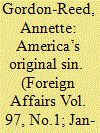

|
|
|
|
|
| Summary/Abstract |
The documents most closely associated with the creation of the United States—the Declaration of Independence and the Constitution—present a problem with which Americans have been contending from the country’s beginning: how to reconcile the values espoused in those texts with the United States’ original sin of slavery, the flaw that marred the country’s creation, warped its prospects, and eventually plunged it into civil war. The Declaration of Independence had a specific purpose: to cut the ties between the American colonies and Great Britain and establish a new country that would take its place among the nations of the world. But thanks to the vaulting language of its famous preamble, the document instantly came to mean more than that. Its confident statement that “all men are created equal,” with “unalienable Rights” to “Life, Liberty, and the pursuit of Happiness,” put notions of freedom and equality at the heart of the American experiment. Yet it was written by a slave owner, Thomas Jefferson, and released into 13 colonies that all, to one degree or another, allowed slavery.
|
|
|
|
|
|
|
|
|
|
|
|
|
|
|
|
| 2 |
ID:
124733
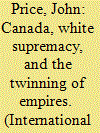

|
|
|
|
|
| Publication |
2013.
|
| Summary/Abstract |
Taking a transnational approach, this essay explores the dynamic circuits of global racisms, resistance, and imperial politics that obliged Canadian policymakers to secure racist exclusions while simultaneously obscuring them. The case studies examined in this essay-British Columbia's denial of the franchise to First Nations and Chinese, adoption of the Natal Act, and the comprehensive federal exclusions adopted after the 1907 white race riots in Vancouver-illustrate how racist immigration policies, both provincial and federal, had to take into account resistance and international factors as perceived by the British Colonial Office. Taken in conjunction with Indigenous history, the history of transpacific migration to Canada offers important insights into the role of white supremacy in a colonial settler state such as Canada.
|
|
|
|
|
|
|
|
|
|
|
|
|
|
|
|
| 3 |
ID:
192013
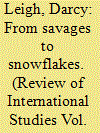

|
|
|
|
|
| Summary/Abstract |
Right-wing free speech advocacy is increasingly shaping global politics. In IR, free speech has generally been viewed within human rights and international legal frameworks. However, this article shows that contemporary free speech advocates often ignore or oppose human rights and international law, focusing instead on (what they describe as) a defence of the nation state against the enemies of free speech. This article examines this articulation of free speech's enemies: first historically as the ‘savage’ in John Stuart Mill's influential formulation of free speech; and then contemporarily as the ‘snowflake’, ‘mob’, and ‘cultural Marxist’ by elected officials and lobbyists in the UK and US. The article argues that John Stuart Mill's savage is figured within a racialised civilisational hierarchy of degrees of humanity. Today, right-wing free speech advocates extend and reconfigure this hierarchy, imagining the ‘snowflake’, ‘mob’, and ‘cultural Marxist’ as lesser human, subhuman, and extra-human, respectively. Thus, in contrast to rights-based analyses of free speech advocacy – which assume or assess the promotion of rights as a ‘public good’ – the article argues that narratives of free speech's enemies are deployed by right-wing free speech advocates to underwrite racialised policy responses and global hierarchies.
|
|
|
|
|
|
|
|
|
|
|
|
|
|
|
|
| 4 |
ID:
189409
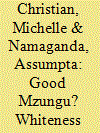

|
|
|
|
|
| Summary/Abstract |
Scholars looking at whiteness through a postcolonial lens have notably explored the lingering and multi-faceted nature of whiteness in the wake of empire. We apply Shome’s argument that whiteness is rendered visible through how it is ‘disembodied’ to explore how whiteness is signified and interpreted in a postcolonial Ugandan context and with the term Mzungu. Disembodied whiteness centres the discursive and material forms of whiteness. Interview and focus group data from domestic workers who work for foreigners in Uganda are analysed. We argue in Uganda whiteness is structurally present in the growth of the development aid state and discursively understood in contrast and relation to Africanness and Blackness. Whiteness, Mzungu, African, Black represents multiple understandings and a duality for the Ugandan domestic workers who work in the foreign households of the aid state. Ultimately, postcolonial whiteness in Uganda sustains white supremacy, but fissures, contestation, and disruption also follow its production.
|
|
|
|
|
|
|
|
|
|
|
|
|
|
|
|
| 5 |
ID:
006382
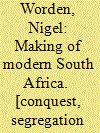

|
|
|
|
|
| Edition |
2nd ed.
|
| Publication |
Oxford, Blackwell, 1995.
|
| Description |
xvi, 171p.: mapspbk
|
| Series |
Historical Association Studies
|
| Standard Number |
0631198822
|
|
|
|
|
|
|
|
|
|
|
|
Copies: C:1/I:0,R:0,Q:0
Circulation
| Accession# | Call# | Current Location | Status | Policy | Location |
| 038038 | 968/WOR 038038 | Main | On Shelf | General | |
|
|
|
|
| 6 |
ID:
188074
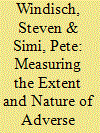

|
|
|
|
|
| Summary/Abstract |
While progress has been made to understand mid-life correlates associated with extremist participation, much less research focuses on adolescent risk factors. The purpose of the current study is to expand upon the focus on individual-level correlates by assessing the extent and nature of childhood adversity among a sample of former white supremacists. The current study relies on in-depth life-history interviews with ninety-one North America-based former white supremacists and the Adverse Childhood Experiences questionnaire. Overall, the current sample contained elevated rates of childhood risk factors with 63 percent of participants having experienced four or more adverse experiences during the first eighteen years of their lives (as compared to 55 percent of a comparison “high risk” sample and 16 percent of the U.S. general population sample). Furthermore, participants discussed a variety of maladaptive coping strategies associated with adversity that generated vulnerabilities to adolescent misconduct and extremism early in the life-course. Our findings indicate that extremist onset does not begin with a single life event but rather is generated, and further exacerbated by the cumulative impact of multiple adverse experiences during childhood.
|
|
|
|
|
|
|
|
|
|
|
|
|
|
|
|
| 7 |
ID:
102124
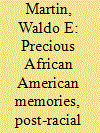

|
|
|
|
|
| Publication |
2011.
|
| Summary/Abstract |
This interdisciplinary essay explores a fundamental paradox at the heart of American race relations since the 1960s: "the changing same." The more things change; the more they remain the same. Combining historical and social-scientific evidence with autobiographical reflections, this discussion critically probes the paradoxical decline and persistence of two dimensions of our enduring racial quagmire: racial inequality and white supremacy. The essay argues that these powerful and interrelated elements of America's continuing racial dilemma demand a massive democratic movement to alleviate both at once. This wide-ranging struggle to realize the promise of American democracy requires more than just a revitalized African American Freedom Struggle that is both intraracial and interracial. Progress toward resolving the seemingly intractable problem of racial inequality in the United States demands far more than intensified efforts to alleviate economic inequality; it requires alleviating white supremacy as well.
|
|
|
|
|
|
|
|
|
|
|
|
|
|
|
|
| 8 |
ID:
179881
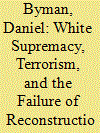

|
|
|
|
|
| Summary/Abstract |
Reconstruction failed in the United States because white Southerners who were opposed to it effectively used violence to undermine Black political power and force uncommitted white Southerners to their side. Although structural factors made it harder to suppress this violence, a series of policy failures proved most important. The Radical Republican-led U.S. government did not deploy enough troops or use them aggressively. Nor did it pursue alternative paths that might have made success more likely, such as arming the Black community. The violence caused Reconstruction to fail, and the victorious white supremacists embedded structural racism into the post-Reconstruction political and social system in the South. Reconstruction's failure illustrates the dangers of half measures. The United States sought to reshape the American South at low cost, in terms of both troop levels and time. In addition, the failure indicates the importance of ensuring that democratization includes the rule of law, not just elections. Most important, Reconstruction demonstrates that a common policy recommendation—compromise with the losers after a civil war—is often fraught, with the price of peace being generations of injustice.
|
|
|
|
|
|
|
|
|
|
|
|
|
|
|
|
| 9 |
ID:
193661
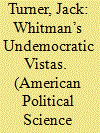

|
|
|
|
|
| Summary/Abstract |
Walt Whitman’s Democratic Vistas (1871) has become a touchstone of democratic theory. Commentators of unusual ideological range uphold the book as politically exemplary. This article demonstrates that recent theoretical celebrations of Democratic Vistas are sanitized and incomplete. I expose the antidemocratic side of Democratic Vistas by analyzing (1) its philosophy of death and (2) its politics of race. Whitman framed his immortalist response to death within an imperialist historical teleology. That teleology entailed violations of Native sovereignty, the political inequality of Black Americans, and the projection of both Black and Native peoples’ evolutionary extinction. Democratic Vistas emerges from this analysis as both necropolitical and white supremacist. If, as Richard Rorty argues, Vistas models a salutary form of reformist “national pride,” then it also illustrates the dangerous susceptibility of such pride to moral innocence and self-deceit.
|
|
|
|
|
|
|
|
|
|
|
|
|
|
|
|
| 10 |
ID:
172202


|
|
|
|
|
| Summary/Abstract |
Few issues have garnered as much attention in recent years as the topic of violent extremism (VE). Although substantial attention has been devoted to investigating the radicalization process, few scholars have examined the obstacles that hinder VE radicalization. Based on in-depth life history interviews, the current study examines five types of barriers that hinder radicalization toward mass casualty violence (MCV): mass casualty violence as counter-productive; preference toward interpersonal violence, changes in focus and availability; internal organizational conflict; and moral apprehension. In general, we address each barrier’s unique contribution to hindering the likelihood of MCV. Finally, we discuss how our findings could be used as part of initiatives aimed at countering violent extremism (CVE).
|
|
|
|
|
|
|
|
|
|
|
|
|
|
|
|
| 11 |
ID:
168180
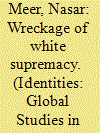

|
|
|
|
|
| Summary/Abstract |
This is how one pictures the angel of history. His face is turned toward the past. Where we perceive a chain of events, he sees one single catastrophe which keeps piling wreckage upon wreckage and hurls it in front of his feet. The angel would like to stay, awaken the dead, and make whole what has been smashed. But a storm is blowing from Paradise; it has got caught in his wings with such violence that the angel can no longer close them. This storm irresistibly propels him into the future to which his back is turned, while the pile of debris before him grows skyward. This storm is what we call progress.
|
|
|
|
|
|
|
|
|
|
|
|
|
|
|
|
|
|
|
|
|